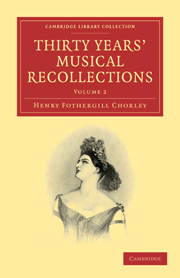Book contents
- Frontmatter
- Contents
- THE YEAR 1847
- THE YEAR 1848 (Her Majesty's Theatre.)
- THE YEAR 1848 (Royal Italian Opera.)
- THE YEAR 1849 (Her Majesty's Theatre.)
- THE YEAR 1849 (Royal Italian Opera.)
- THE YEAR 1850 (Her Majesty's Theatre.)
- THE YEAR 1850 (Royal Italian Opera.)
- THE YEAR 1851 (Her Majesty's Theatre.)
- THE YEAR 1851 (Royal Italian Opera.)
- THE YEAR 1852 (Her Majesty's Theatre.)
- THE YEAR 1852 (Royal Italian Opera.)
- THE YEAR 1853 (Royal Italian Opera.)
- THE YEAR 1854 (Royal Italian Opera)
- THE YEAR 1855 (Royal Italian Opera.)
- THE YEAR 1856 (Her Majesty's Theatre.)
- THE YEAR 1856 (Royal Italian Opera.)
- THE YEAR 1857 (Royal Italian Opera.)
- THE YEAR 1857 (Her Majesty's Theatre.)
- THE YEAR 1858 (Her Majesty's Theatre.—Royal Italian Opera.—Drury Lane.)
- THE YEAR 1859 (Royal Italian Opera.—Drury Lane.)
- The Last Chapter
THE YEAR 1849 (Royal Italian Opera.)
Published online by Cambridge University Press: 29 August 2010
- Frontmatter
- Contents
- THE YEAR 1847
- THE YEAR 1848 (Her Majesty's Theatre.)
- THE YEAR 1848 (Royal Italian Opera.)
- THE YEAR 1849 (Her Majesty's Theatre.)
- THE YEAR 1849 (Royal Italian Opera.)
- THE YEAR 1850 (Her Majesty's Theatre.)
- THE YEAR 1850 (Royal Italian Opera.)
- THE YEAR 1851 (Her Majesty's Theatre.)
- THE YEAR 1851 (Royal Italian Opera.)
- THE YEAR 1852 (Her Majesty's Theatre.)
- THE YEAR 1852 (Royal Italian Opera.)
- THE YEAR 1853 (Royal Italian Opera.)
- THE YEAR 1854 (Royal Italian Opera)
- THE YEAR 1855 (Royal Italian Opera.)
- THE YEAR 1856 (Her Majesty's Theatre.)
- THE YEAR 1856 (Royal Italian Opera.)
- THE YEAR 1857 (Royal Italian Opera.)
- THE YEAR 1857 (Her Majesty's Theatre.)
- THE YEAR 1858 (Her Majesty's Theatre.—Royal Italian Opera.—Drury Lane.)
- THE YEAR 1859 (Royal Italian Opera.—Drury Lane.)
- The Last Chapter
Summary
”Massaniello” was, at last, creditably performed in London, with Signor Mario for its hero (singing and looking the Neapolitan fisherman delightfully)—for its Fenella, Mdlle. Leroux, and for its other two principal characters, Madame Dorus-Gras and M. Massol,—another proof how, year by year, our foreign musical theatres have had more and more to draw on other lands than Italy for their singers.—Madame Dorus-Gras, though never able to lay by her nationality so as to group well with her playfellows—and though deficient in that last elegance, which distinguished Madame Cinti and Madame Sontag—was, nevertheless, an excellent artist, with a combined firmness and volubility of execution which have not been exceeded, and were especially welcome in French music, heard in a concert-room. On the stage she pleased less.—Her appearance was not significant. She was lifeless as an actress. She never mastered Italian—having never mastered French, owing to her Low-Country extraction. For all this, her Alice in “Robert” was excellent. She sung the opening song, “Va dit elle” and the semi-Scottish romance, “Quand j'ai quittai la Normandie” more thoroughly in the metallic, exact style which M. Meyerbeer's music demands, than any other singer whom I have heard attempt the part.—M. Massol, an effective baritone, less thoroughly trained than the lady, was found useful, but not interesting.
We had a Greek lady, too—Mdlle. Angri—in the place of Mdlle. Alboni,—one to whose talent the epithet of eccentric must be applied. Her voice, a contralto, was unique in its quality,—even, easy, hollow, without lusciousness—a little hoarse, without much expression—but it was a voice that told.
- Type
- Chapter
- Information
- Thirty Years' Musical Recollections , pp. 85 - 110Publisher: Cambridge University PressPrint publication year: 2009First published in: 1862



